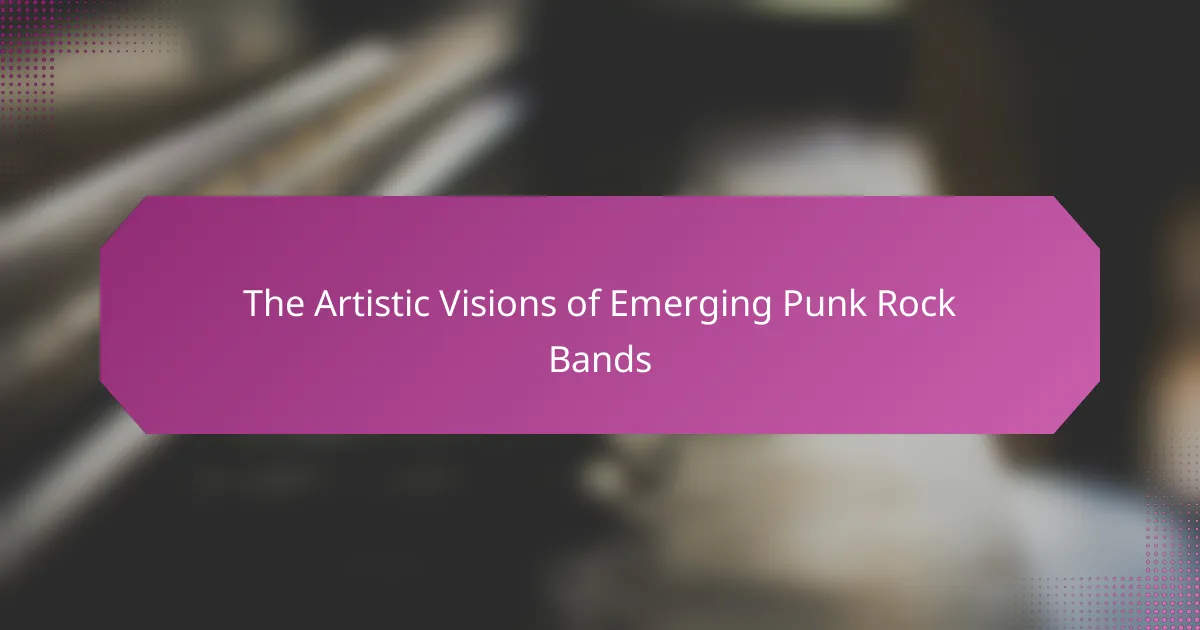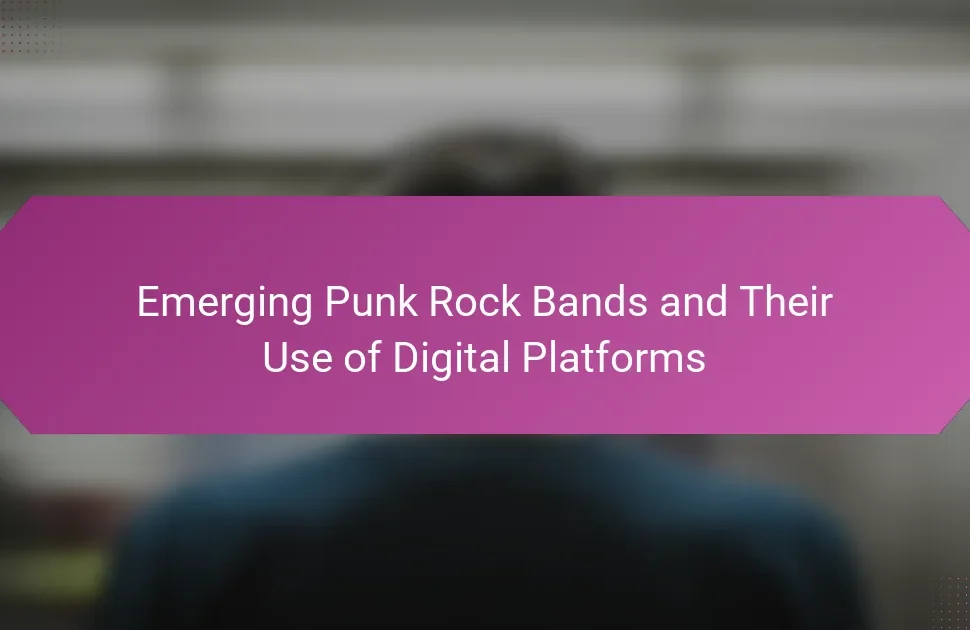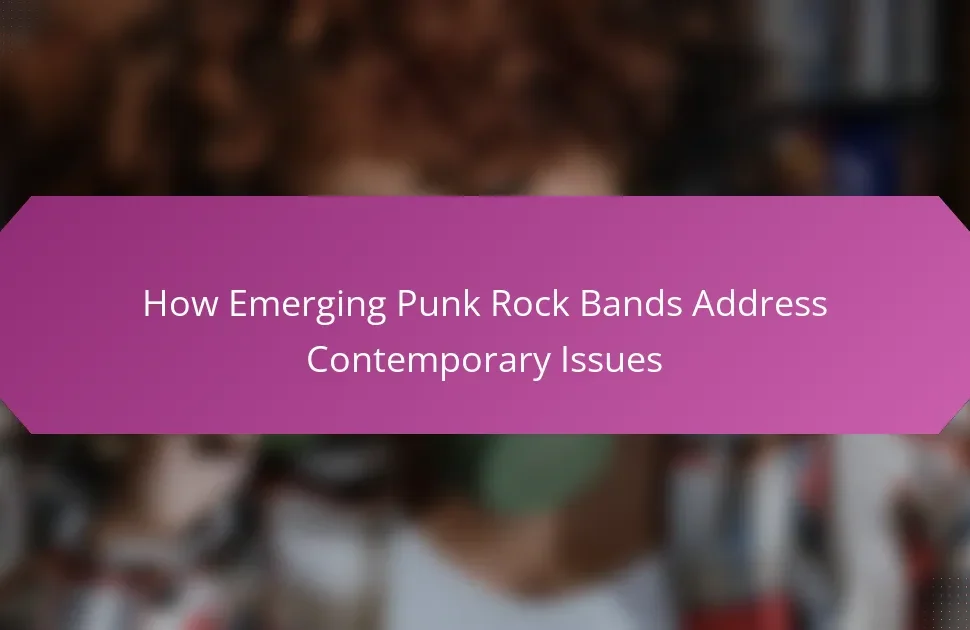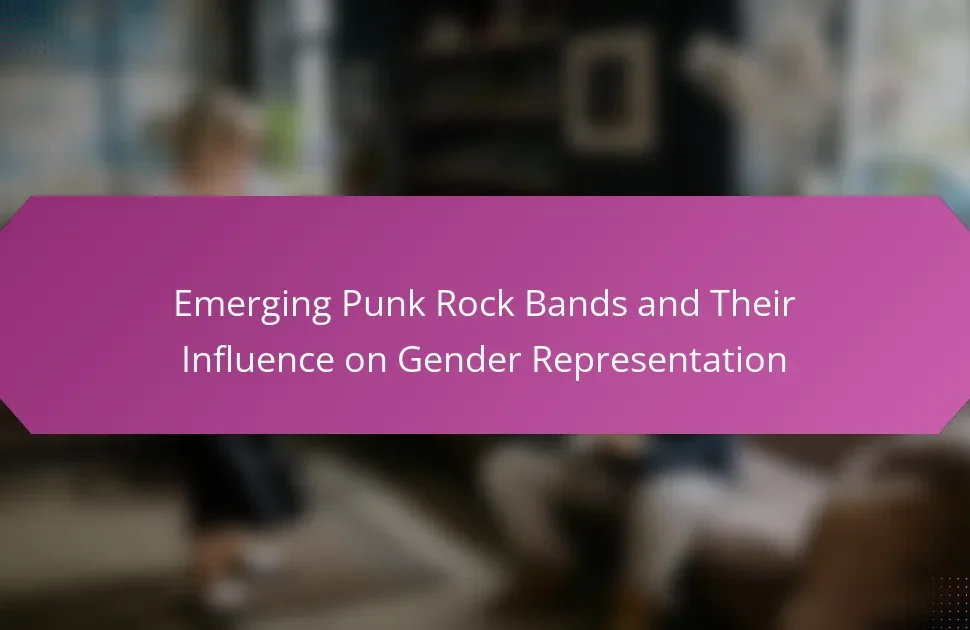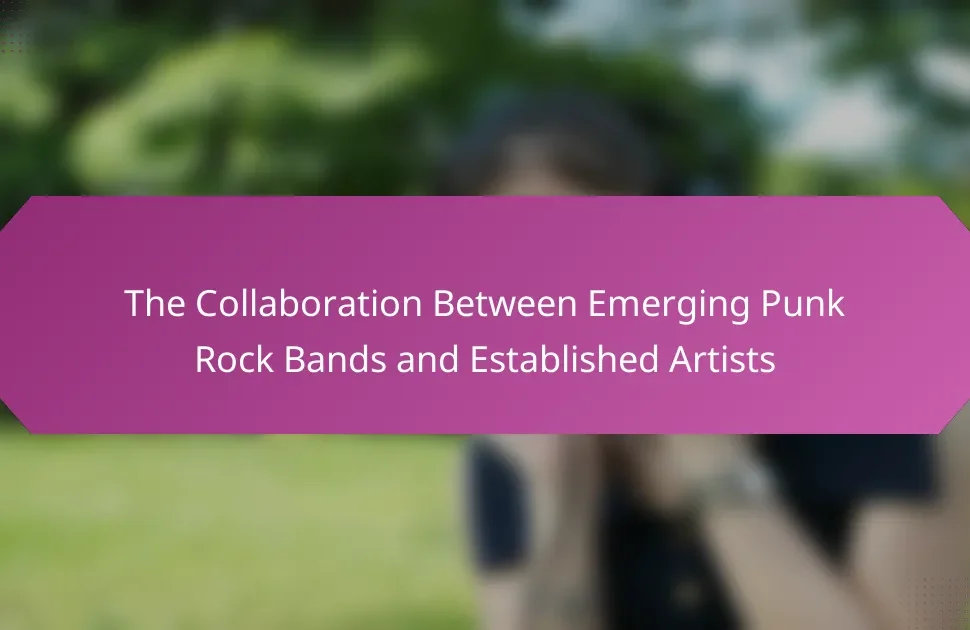Emerging punk rock bands are reshaping the music landscape with their innovative sounds and bold artistic visions. They blend traditional punk with modern influences, explore diverse genres, and tackle pressing social issues through their lyrics. Visual identity plays a crucial role, reflecting rebellion through distinctive artwork and fashion. Community engagement enhances their impact, fostering connections and promoting grassroots movements.
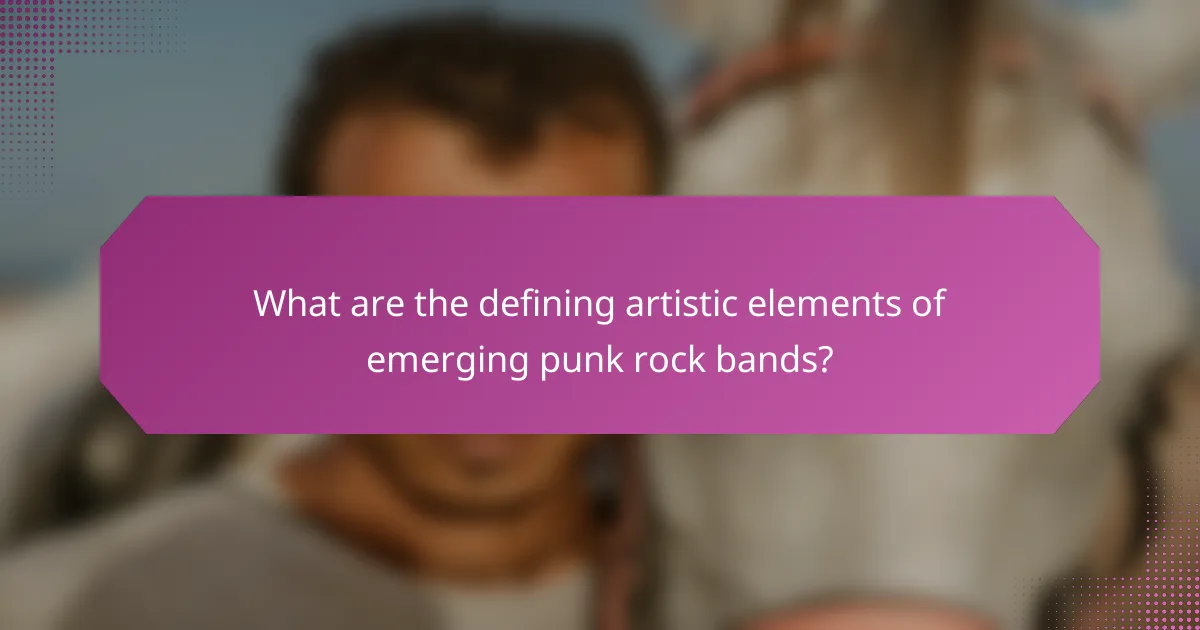
What are the defining artistic elements of emerging punk rock bands?
Emerging punk rock bands define their artistic vision through raw energy, distinctive aesthetics, and social commentary. They often blend traditional punk elements with modern influences, creating a unique sound.
Key artistic elements include:
1. **Musical Innovation**: Bands experiment with various genres, incorporating elements like electronic music or hip-hop.
2. **Visual Identity**: Artwork and fashion reflect rebellion, often featuring bold colours and DIY aesthetics.
3. **Lyricism**: Lyrics frequently address political issues, personal struggles, and societal critiques, resonating with a diverse audience.
4. **Community Engagement**: Many bands actively participate in local scenes, fostering connections and promoting grassroots movements.
These elements collectively contribute to a vibrant and evolving punk rock landscape.
How do visual aesthetics influence the punk rock genre?
Visual aesthetics significantly shape the punk rock genre by reflecting its core values of rebellion and individuality. Emerging punk rock bands often utilise bold colours, striking visuals, and unconventional designs to convey their artistic visions. This visual expression enhances their music’s emotional impact and fosters a sense of community among fans. The unique attributes of each band’s aesthetic can differentiate their identity within the genre, allowing them to connect with audiences on a deeper level. Additionally, the integration of visual art with music creates a multi-sensory experience that amplifies the punk rock ethos.
Which themes are prevalent in the lyrics of new punk rock bands?
Emerging punk rock bands often explore themes of social justice, personal struggle, and anti-establishment sentiments. These themes reflect a desire for change and a critique of societal norms. Many lyrics address issues such as mental health, political discontent, and identity, resonating with a diverse audience. Unique attributes include a raw, unfiltered style and a focus on authenticity, differentiating them from mainstream genres.
What role does fashion play in the identity of punk rock artists?
Fashion is integral to the identity of punk rock artists, serving as a visual expression of their values and beliefs. Punk fashion often features unique attributes like DIY aesthetics, bold colours, and unconventional styles, which reflect rebellion against societal norms. The attire, including leather jackets, band tees, and distinctive hairstyles, symbolizes individuality and nonconformity. As punk rock evolves, emerging bands continue to innovate their fashion choices, reinforcing their artistic visions and connecting with their audience on a deeper level.
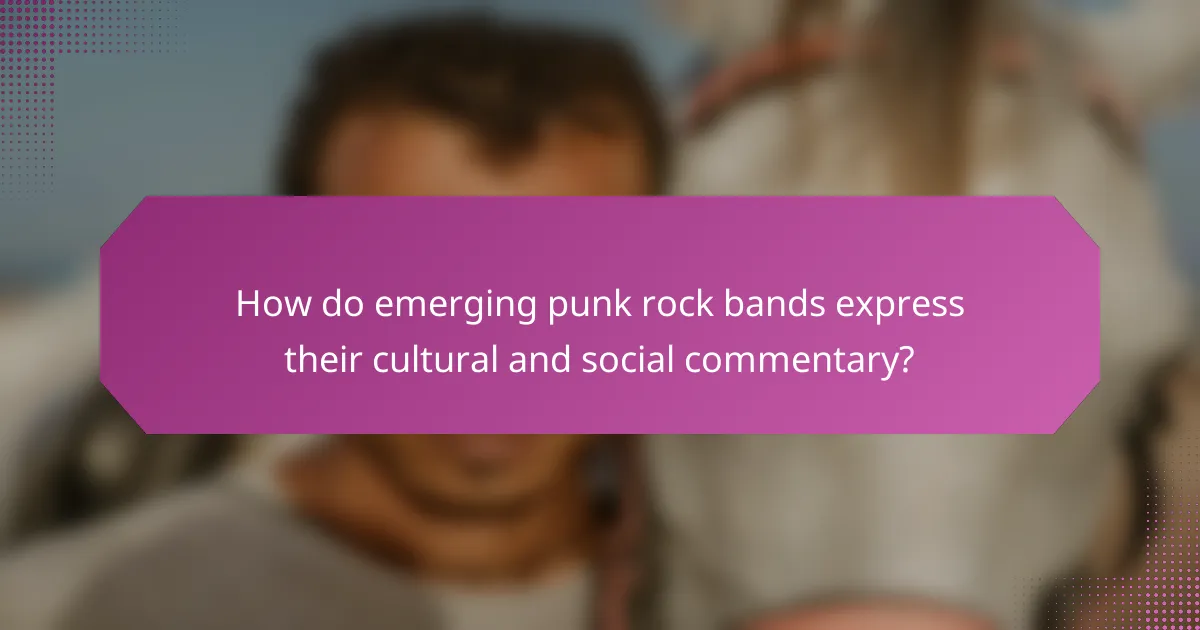
How do emerging punk rock bands express their cultural and social commentary?
Emerging punk rock bands express cultural and social commentary through raw lyrics and energetic performances. They tackle issues like inequality, mental health, and political disillusionment, often reflecting their unique perspectives. This genre’s authenticity resonates with audiences seeking genuine connections. Bands like IDLES and Amyl and the Sniffers exemplify this trend, using their platforms to challenge societal norms and inspire change. Their music serves as a rallying cry for marginalised voices, making punk rock a relevant force in contemporary discourse.
What societal issues are commonly addressed in punk rock music today?
Punk rock music today commonly addresses issues like social inequality, political corruption, and mental health. Emerging bands express dissent against societal norms and advocate for change through their lyrics and artistic visions. Many focus on the struggles of marginalised communities, emphasising themes of empowerment and resilience. Unique attributes of contemporary punk include a blend of diverse musical influences and a strong DIY ethic, which enhances their message and reach.
How do regional influences shape the artistic visions of punk rock bands?
Regional influences significantly shape the artistic visions of emerging punk rock bands by reflecting local culture, social issues, and historical contexts. Bands often draw inspiration from their surroundings, incorporating local dialects, themes, and music styles into their work. For example, bands from urban areas may address themes of social injustice, while those from rural regions might explore themes of isolation or community. This connection to place creates a unique sound and message that resonates with their audience. Local scenes also foster collaboration, allowing bands to share ideas and refine their artistic expressions, enhancing the overall punk rock landscape.
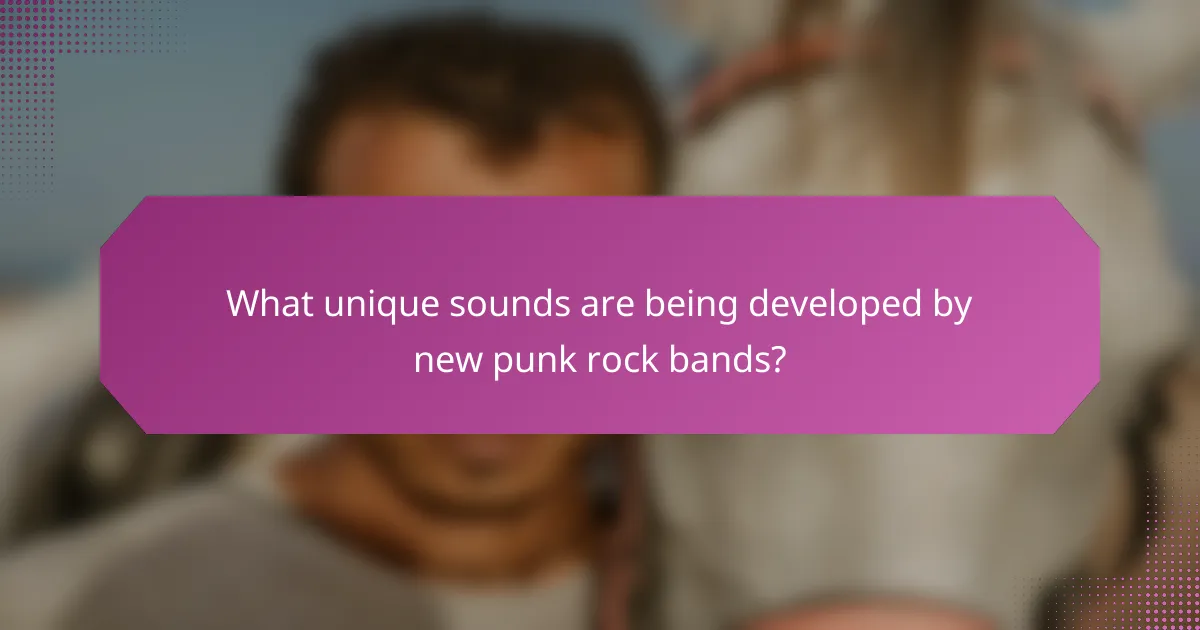
What unique sounds are being developed by new punk rock bands?
Emerging punk rock bands are developing unique sounds that blend traditional punk elements with diverse influences. They incorporate genres like electronic, folk, and hip-hop, creating fresh and innovative music. Many bands emphasise raw, unpolished production, reflecting a DIY ethos. Unique lyrical themes often focus on social issues, personal struggles, and identity, setting them apart from mainstream punk. These bands push boundaries, fostering a vibrant and evolving punk scene.
How do instrumentation choices differentiate emerging punk rock bands?
Instrumentation choices significantly shape the artistic visions of emerging punk rock bands. Bands often select instruments that reflect their unique sound and message. For instance, the use of vintage guitars can evoke nostalgia, while electronic elements might introduce modernity.
These choices influence the band’s identity, allowing them to differentiate themselves in a crowded genre. Unique attributes, such as a preference for unconventional instruments or production techniques, can set a band apart. For example, a band using a mix of analogue and digital sounds may appeal to diverse audiences.
Moreover, the instrumentation can affect lyrical themes and overall energy, fostering a distinct stage presence. Bands that emphasise raw, unpolished sounds often resonate with traditional punk values, while those incorporating polished arrangements might attract broader listeners.
Ultimately, instrumentation is a crucial element in defining the artistic direction of emerging punk rock bands, shaping their sound and cultural impact.
Which production techniques are favored by contemporary punk rock artists?
Contemporary punk rock artists favor production techniques that emphasise raw sound and authenticity. Many use analogue recording methods to capture energy and spontaneity.
Digital editing is often employed for precision while maintaining a gritty aesthetic. Techniques like layering vocals and instrument tracks enhance the overall impact.
Live recordings are popular, showcasing the band’s energy and audience interaction. This approach captures the essence of punk’s rebellious spirit.
Emerging bands also experiment with unconventional instruments and sounds, reflecting their unique artistic visions. This diversity contributes to the genre’s evolving landscape.
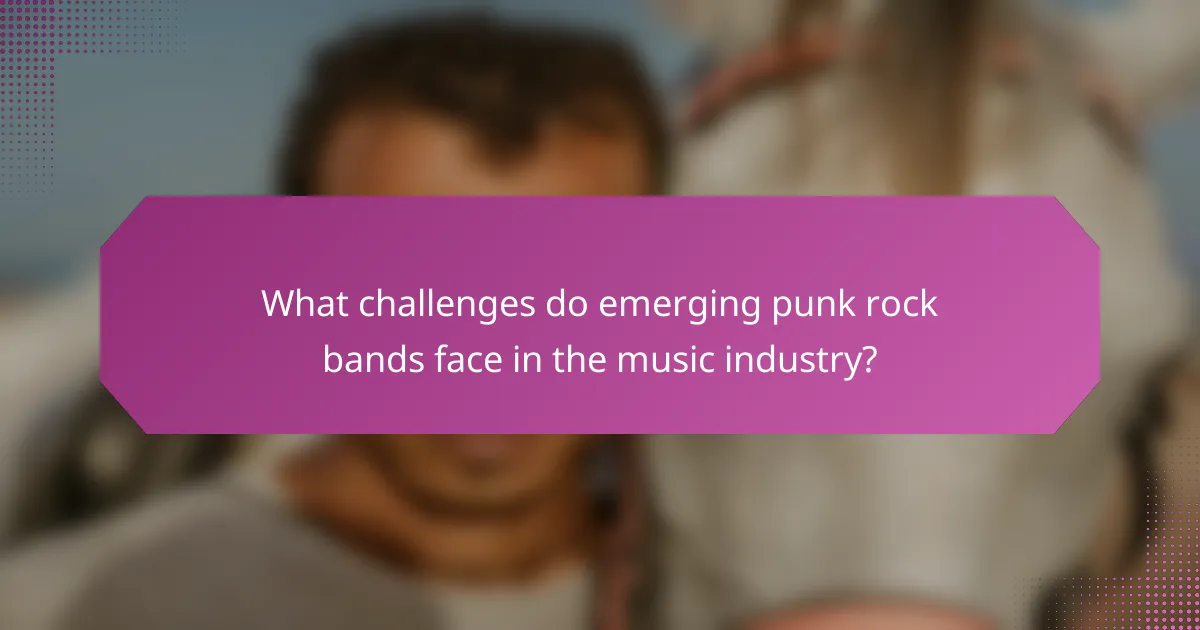
What challenges do emerging punk rock bands face in the music industry?
Emerging punk rock bands face significant challenges in the music industry, including limited exposure, financial constraints, and competition. These obstacles hinder their artistic visions and growth potential.
Limited exposure restricts their ability to reach wider audiences. Many emerging bands struggle to secure gigs, especially in competitive markets dominated by established acts. Financial constraints often lead to difficulties in producing quality recordings and marketing efforts.
Competition from various genres complicates their efforts to stand out. Punk rock’s niche appeal may limit opportunities for mainstream success, making it harder for these bands to gain traction.
Additionally, the digital landscape poses unique challenges. While social media offers promotional avenues, it requires savvy marketing skills and consistent engagement to build a loyal fan base.
How do financial constraints impact artistic expression in punk rock?
Financial constraints often enhance artistic expression in punk rock by fostering creativity and innovation. Limited resources compel emerging bands to explore unconventional methods and raw sounds, resulting in unique music that resonates with their audience. This environment encourages collaboration and DIY ethics, which are core tenets of punk culture. Additionally, financial limitations can lead to a more authentic representation of struggles, as artists draw inspiration from their real-life experiences. Ultimately, these constraints can transform challenges into powerful artistic statements.
What barriers exist for new punk rock bands in gaining mainstream recognition?
Emerging punk rock bands face significant barriers to gaining mainstream recognition, including limited access to funding and industry connections. Many struggle with the saturation of the music market, making it difficult to stand out. Additionally, traditional media often overlooks underground genres, favoring more commercial sounds. The reliance on social media for promotion can also be a double-edged sword, as it requires constant engagement and content creation to maintain visibility. These challenges hinder their ability to reach wider audiences and secure opportunities for growth.
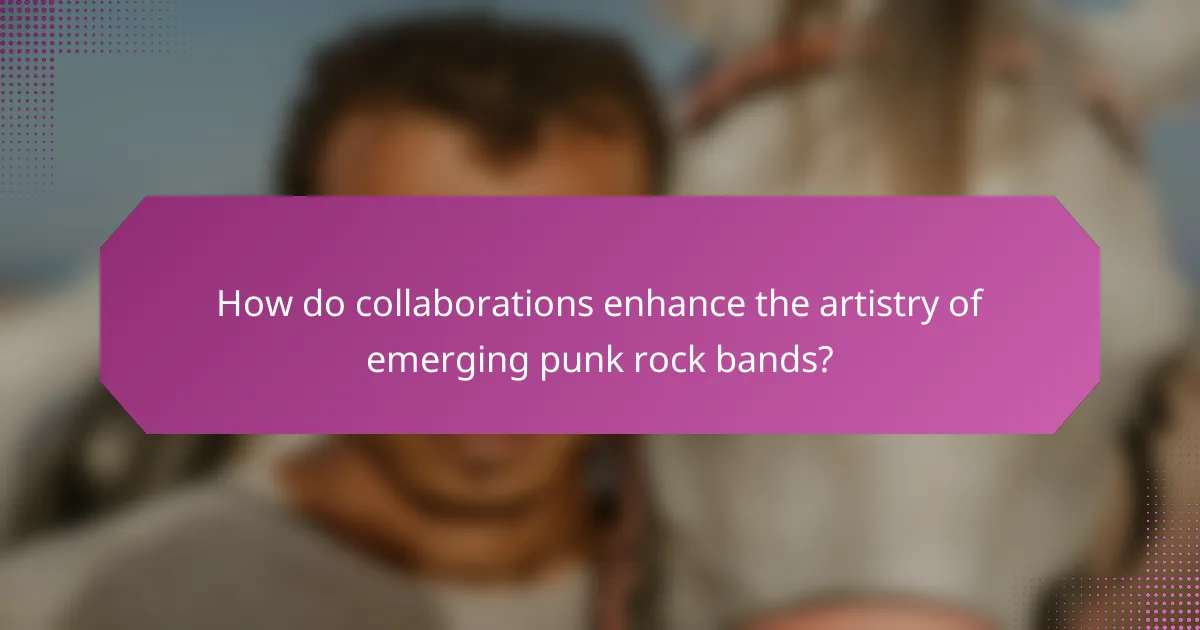
How do collaborations enhance the artistry of emerging punk rock bands?
Collaborations enhance the artistry of emerging punk rock bands by fostering creativity and expanding their musical horizons. They allow artists to blend diverse influences, resulting in unique sounds. Collaborative projects often lead to innovative songwriting techniques, pushing bands to explore unconventional themes. Additionally, partnerships with established artists can provide exposure and credibility, helping emerging bands reach wider audiences. This synergy not only strengthens their artistic identity but also cultivates a vibrant punk community that thrives on shared experiences and collective expression.
Which artists and genres are commonly collaborated with in the punk scene?
Punk rock bands commonly collaborate with artists from genres like hardcore, metal, and alternative rock. Notable collaborations often include punk bands working with hip-hop artists, creating unique cross-genre sounds. Emerging punk bands frequently partner with local indie musicians to enhance their artistic visions. Collaborations with electronic artists are also gaining traction, reflecting punk’s evolving landscape.
What benefits do collaborations bring to the creative process?
Collaborations enhance the creative process by fostering diverse ideas and perspectives. They encourage innovation and experimentation, leading to unique artistic expressions. Collaborating punk rock bands can blend various musical styles, enriching their sound. This synergy often results in a stronger emotional connection with audiences, amplifying the impact of their messages.
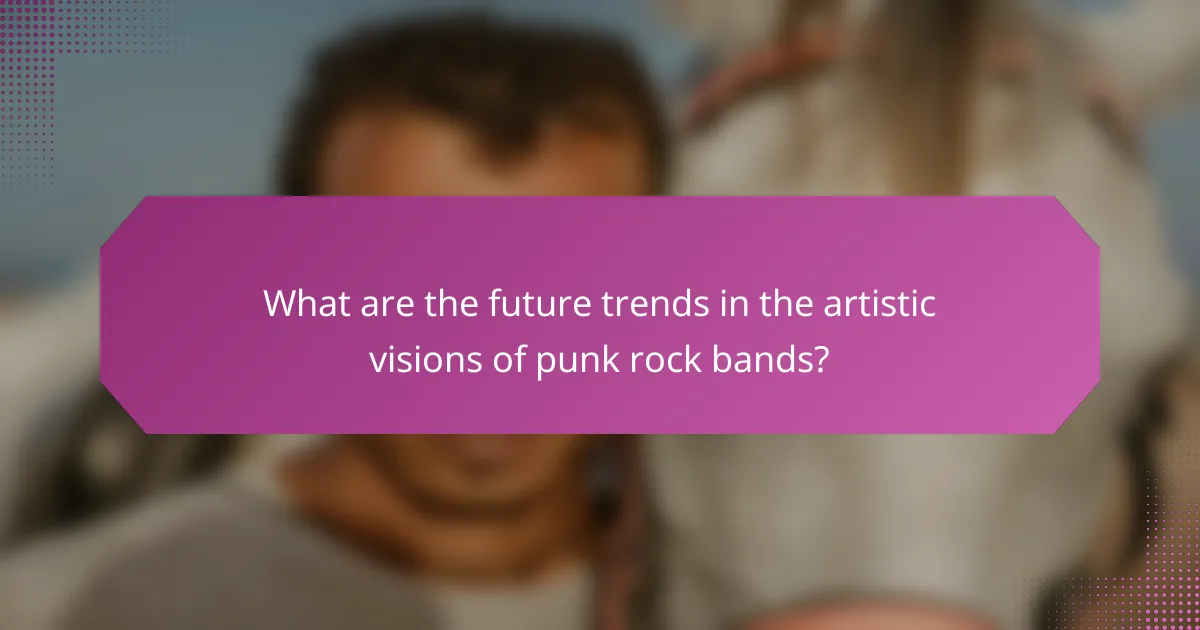
What are the future trends in the artistic visions of punk rock bands?
Emerging punk rock bands are increasingly embracing diverse artistic visions that reflect contemporary social issues. These trends include the integration of multimedia elements, such as visual art and technology, into performances. Bands are also exploring themes of inclusivity and mental health, resonating with younger audiences. Unique sound experimentation is becoming a hallmark, blending punk with other genres like electronic and hip-hop. As a result, the punk rock scene is evolving into a more collaborative and boundary-pushing space, challenging traditional norms while maintaining its rebellious spirit.
How is technology influencing the evolution of punk rock music?
Technology significantly influences the evolution of punk rock music by enhancing creativity and accessibility. Emerging punk rock bands utilise digital tools for production, distribution, and promotion, allowing for diverse artistic expressions.
The rise of social media platforms enables bands to reach global audiences instantly, fostering community and collaboration. For example, online streaming services provide a platform for independent artists to share their music without traditional gatekeepers.
Moreover, technology facilitates innovative sounds through software and hardware advancements, expanding the genre’s sonic possibilities. This evolution reflects a unique attribute of contemporary punk rock, where DIY ethics merge with modern technology.
Overall, technology reshapes the punk rock landscape, encouraging experimentation and inclusivity while preserving the genre’s rebellious spirit.
What emerging sub-genres are shaping the future of punk rock?
Emerging sub-genres are reshaping punk rock by incorporating diverse influences and innovative sounds. Notable sub-genres include pop-punk revival, which blends catchy melodies with punk energy, and post-punk, emphasising experimental sounds and introspective lyrics. Additionally, DIY punk continues to thrive, driven by grassroots movements and independent labels, fostering authenticity. Bands are also exploring themes of social justice and mental health, reflecting contemporary issues. These evolving artistic visions are redefining punk rock’s future, attracting new audiences while honoring its roots.
What best practices can emerging punk rock bands adopt to stay relevant?
Emerging punk rock bands can adopt several best practices to stay relevant. They should focus on authentic storytelling, connecting with their audience through personal experiences and social issues. Engaging with fans on social media cultivates a loyal community. Collaborating with other artists expands their reach and introduces new influences. Regularly releasing music and content keeps their presence alive in the fast-paced music scene. Finally, participating in local events and grassroots movements strengthens their ties to the punk community.
